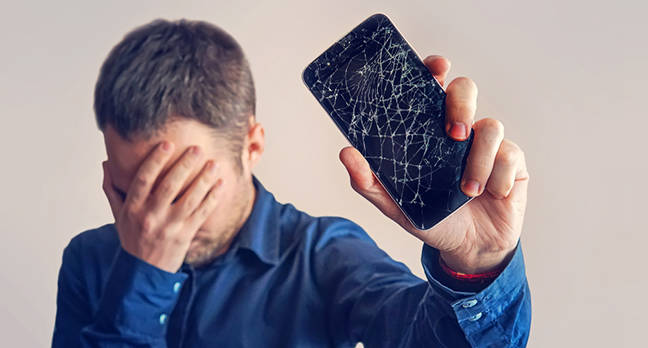Your Phone's Cracked Screen May One Day Heal Itself, But Try Not To Drop It For Now

Smartphones with self-healing displays could be on sale within the next five years, according to the latest predictions from research outfit CCS Insight.
In the analyst's published expectations for the technology landscape in 2024 and beyond, it believes that by 2028, we will see displays for smartphones and other consumer electronic devices that will be capable of self-healing in response to minor scratches and dents.
It has become a common sight to spot people on public transport and elsewhere using handsets with large visible cracks in the display, but CCS Insight isn't saying it expects to see a solution for that issue, and instead thinks the cure will fix only minor damage such as scratches from house keys and the like.
"What we're saying is that we expect to see something like a nano coating for displays that if it gets scratched will react with the air to create a new build-up of material," chief analyst Ben Wood told us.
The tech isn't currently available, but based on developments CCS Insight said it is witnessing in the phone sector, it decided to "put a stake in the ground" and predict a launch before 2028 by either a smartphone maker or a glass company such as Corning, famous for its Gorilla Glass.
This isn't a completely new idea. LG produced a phone called the G Flex back in 2013 that had a curved, flexible screen and the rear cover was said to have a special coating that could self-repair hairline scratches.
"It didn't work very well," according to Wood.
- Google pays Apple $18B to $20B a year to keep its search in iPhone
- Apple blames iOS 17 bug for overheating iPhone 15 woes
- Search for phone signal caused oil spill, say Japanese investigators
- Teardown reveals iPhone 15 to be series of questionable design decisions
Motorola was granted a US patent back in 2017 for a phone display that can heal itself if cracked, and it seems to be an evergreen rumor among Apple followers that the igizmo maker is on the brink of delivering a device with a self-healing screen, possibly as part of a folding iPhone model.
CCS Insight has also itself previously published a blog about a self-mending glass technology uncovered by researchers at the University of Tokyo in Japan that could potentially lead to self-healing screens for phones.
So what is new now? Wood told us that there are lots of people working on this concept at the moment, which led the company to believe that it is a capability which will soon come to market.
CCS Insight's other predictions include that all the current hype around generative AI will experience a "cold shower" in 2024 as the realities of cost, risk, and complexity start to bite; and EU legislation aimed at regulating AI will be delayed and redrawn multiple times due to the speed at which the technology is evolving.
The company also expects that more than half of Apple iPhones in use by the end of 2023 will be secondhand devices. As a consequence of that, Apple will move to take greater control of the second-hand iPhone market in 2024 by introducing a "Verified" grading system. ®
From Chip War To Cloud War: The Next Frontier In Global Tech Competition
The global chip war, characterized by intense competition among nations and corporations for supremacy in semiconductor ... Read more
The High Stakes Of Tech Regulation: Security Risks And Market Dynamics
The influence of tech giants in the global economy continues to grow, raising crucial questions about how to balance sec... Read more
The Tyranny Of Instagram Interiors: Why It's Time To Break Free From Algorithm-Driven Aesthetics
Instagram has become a dominant force in shaping interior design trends, offering a seemingly endless stream of inspirat... Read more
The Data Crunch In AI: Strategies For Sustainability
Exploring solutions to the imminent exhaustion of internet data for AI training.As the artificial intelligence (AI) indu... Read more
Google Abandons Four-Year Effort To Remove Cookies From Chrome Browser
After four years of dedicated effort, Google has decided to abandon its plan to remove third-party cookies from its Chro... Read more
LinkedIn Embraces AI And Gamification To Drive User Engagement And Revenue
In an effort to tackle slowing revenue growth and enhance user engagement, LinkedIn is turning to artificial intelligenc... Read more

